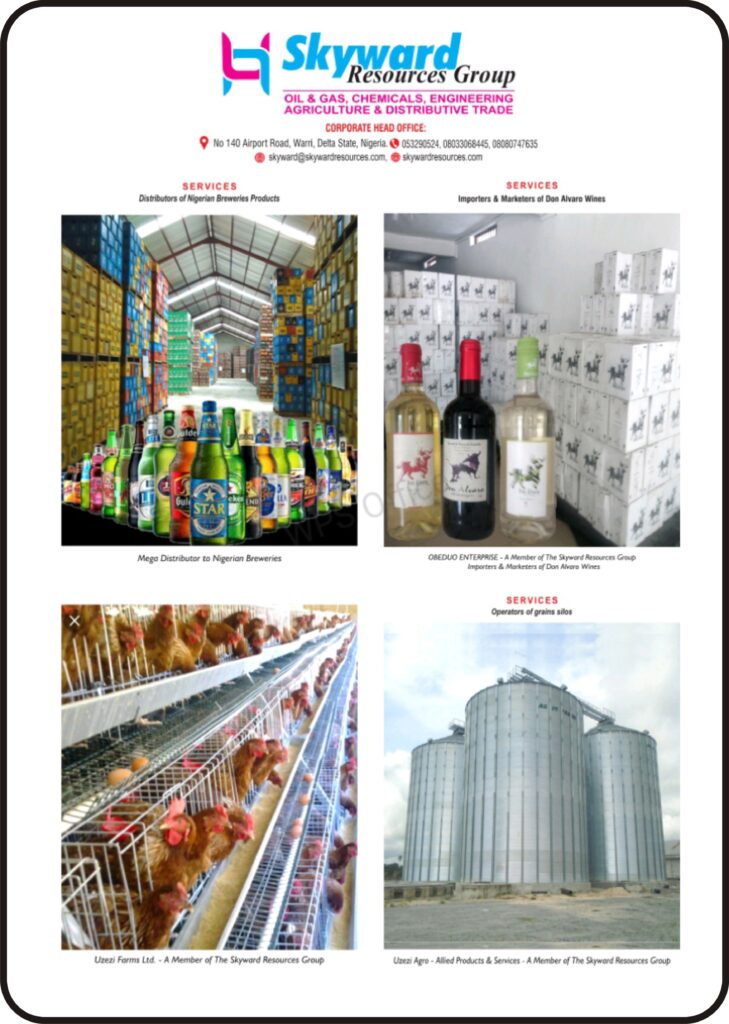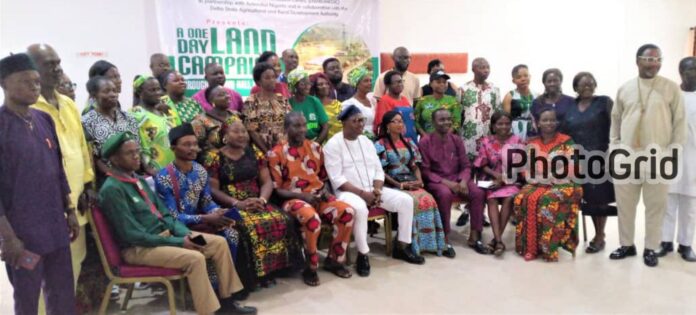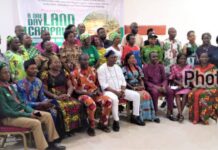By Emeka Nwokocha
Environmental and Rural Mediation Centre (ENVIRUMEDIC), is advancing measures to boost productivity in agriculture and promote food security in Delta State.

This was practically demonstrated on Friday 13 December, 2024, during a one-day programme tagged, “One-Day Land Campaign Through Townhall Meeting,” aimed at removing the bottlenecks in women’s access to land.
The Executive Director of ENVIRUMEDIC, Chief Monday Ogheneruona Itoghor, in his presentation, entitled, “Women access to land: Leave no woman behind to equitable access to farm land,” said, “Women need unrestricted access to arable land to scale up agricultural activities and production of food to meet the dietary needs of the teeming population of Delta State.”
He emphasised importance of land in sustainable agricultural development, stating that, “Land plays an important role in women’s socio-economic development and empowerment especially for poverty alleviation.”

He added, “Land is the bedrock of food security, improved agriculture and acceleration of Sustainable Development Goals (SDGs).”
Continuing, Chief Itoghor noted that despite the benefits land offers, it is obvious that women own and control less land than men, attributing it to the skewed Nigerian land tenure system and archaic patriarchal system.
He further noted that, “The 1999 Nigerian constitution and other legal instruments allow women to own land, but in practice, women’s access to land is quite limited.”
He said, “According to the Ministry of Women Affairs, only 10% of landowners in Nigeria are women.”
Chief Itoghor further noted that many had argued that in Nigeria, women’s rights appear to be protected considering the fact that the country is a signatory to the Convention on the Elimination of All forms of Discrimination Against Women (CEDAW) and the Solemn Declaration on Gender Equality in Africa (SD-GEA), still the protection is mostly practicable on paper.
He added, “Despite the fact that a paltry 10% of women own land, 75% of food sold at local markets is produced by women, thus raising the questions, what are the barriers militating against women access to land? How would relevant stakeholders and opinion leaders help to support women access to land and market? And how would stakeholders help to identify policy gaps and recommend solutions to address the challenges?”
Stakeholders of the agriculture sector gave their perspectives on the subject matter of the programme.
Speaking, Mr. Charles Mordi, representative of the Commissioner of Agriculture, Delta State, stated that women’s ownership of land for agriculture activities might not be a major challenge in some communities.
He however, expressed concern over the speed at which real estate developers acquire massive lands from communities, a development he said would soon encroach into available farm lands, leaving communities scrambling for farm lands in the near future. He called on the government of Delta State to properly regulate the real estate business.
Continuing, he expressed the compelling need for strengthening of the capacity of women farmers in Delta State so they could brace up with inherent challenges in the agriculture sector.
He added, “Delta State government is putting measures in place through its policies to boost productivity in the agriculture sector,” even as he charged women farmers to be more determined in their advocacy targeted at improving on farming, adding that female farmers could attract some benefits if they key into government’s programmes that aim at supporting farmers.
He added that the identified challenges in the agriculture sector would be communicated to the Commissioner of Agriculture, Delta State, assuring that positive steps would be taken by the government to improve productivity in agriculture.
He further advised women farmers to incorporate business into agriculture activities to be able to make better progress and earn good revenue.
Acknowledging the challenges in agriculture as identified at the session, the representative of the Delta State House of Assembly, Mrs. Abigail Eseadi, said that government’s efforts to catalyse production in the agriculture sector were on top gear. She stated, “There is ongoing legislation to reposition the agriculture sector for better growth,” adding that roles such as clearing of farm lands, improving the knowledge of farmers through training, tackling insecurity, providing cluster of farm lands to farmers, promoting irrigation farming, providing financial services to farmers among others, would be factored into the ongoing legislation at the Delta State House of Assembly.
Also speaking, the Director at the Delta State Ministry of Agriculture and Natural Resources (MANR), Mrs. Patience Isioma Aniye said that “Delta State is set to address complaints about nonavailability of land for agriculture activities through its communal land for agriculture initiative which is easily accessible to farmers across the state.”
She further stated that issues of political farmers would be addressed through the government’s ongoing farmers verification process.
Speaking earlier, Fidelia Eze-Owenz, Esther, Grace Osadjoku, Coordinator, SWOFON, Delta State, Eniyekpemi Bibo-ere, Faith Oso, including offtakers – Mary Ogbolu, Joy Anyare, and Danyegha Godsgiven identified the challenges hampering growth in the agriculture sector, which include lack of irrigation system, lack of education, lack of access road to farms, lack of finance, hijacking of inputs by political farmers, post harvest losses, insecurity, flooding, lack of technology, inadequate support from government and subsistence farming technique. They proffered measures to address the challenges, while calling on the government of Delta State to pay more attention to the agriculture sector.
Continuing, they shared their experience on the progress being made in the use of organic manure on crops, including the use of natural mulching technique to weed grasses.
Also speaking, the Director of Extension Services, Delta State Agriculture & Rural Development Authority (DARDA), Mrs. Mamode Ogboru said women could leverage the Delta State communal land for agriculture initiative and acquire land for farming.
She charged the government to ensure insecurity is nipped in the bud to create the enabling environment for farming to thrive.
She urged communities to complement government’s efforts in tackling insecurity, even as she expressed the need for farmers to be linked to offtakers in order to address post harvest losses, noting that processing centres, especially for perishable farm produce are important as it will encourage the women to scale up productivity in agriculture.
She stressed the need for financial services to be made available to women farmers, adding that women should be trained on new techniques for farming.
The Presidents-General (PGs) of Ophorigbala community, Obikwele community, Ossissa community and Ebor-Orogun community gave more insight on the challenges bedeviling the agriculture sector and expressed their communities’ commitment to provide support to women farmers and collaborate with governmet to advance farming in the state and increase food production.
The Heads of Departments in various local government areas expressed the unwavering commitment of Delta State government to improving agriculture activities in the state.
They commended the government for the support given to farmers in recent times, even as they made further demand to the government to address critical challenges in the agriculture sector in order to boost food production and promote food security.
The highpoint of the programme was exhibition of farm produce by farmers from various communities and narrating of progress they have made in the practice of agroecology in recent times.











